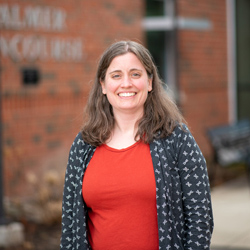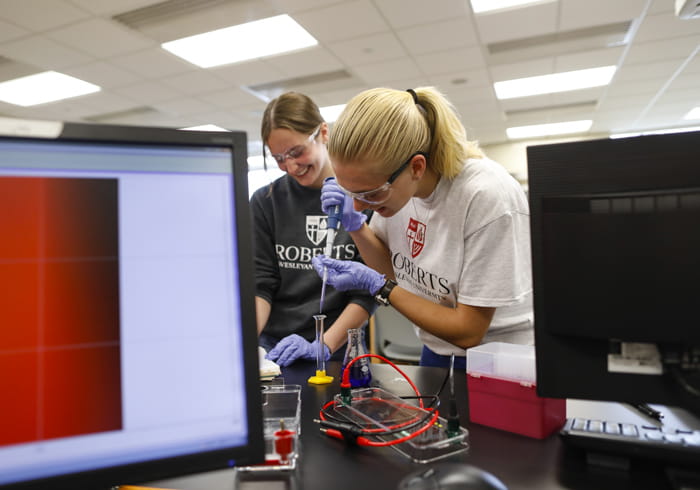Medical Technology
Medical Technology: Use Your Lab Skills to Help Patients
Do you want to help patients behind the scenes? Earn your bachelor’s degree in Medical Technology. Become a vital link in the healthcare chain and work with life-saving equipment. Immerse yourself in hands-on learning at local hospitals. Are you ready to rise to the challenge?
Upon graduation, you’ll be ready to become nationally certified. We’ll prepare you to pass the Board of Registry exam given by the American Society of Clinical Pathologists. Plus, you'll be eligible for licensure through the N.Y.S. Education Department Office of the Professions.
Visit Us
Ready to take the next step? Sign up for a visit! Call us at 585-594-7612 or schedule online.
Get More Info
4 Year Promise
At Roberts, we are committed to giving you a head start in earning income and achieving your personal goals by helping you graduate in four years. In fact, we guarantee it.
Program Highlights
PREPARE FOR YOUR CAREER
Become ready for a clinical laboratory career with your bachelor’s degree.
BECOME CERTIFIED AND LICENSED
You’ll graduate prepared to pass the national certification exam and become licensed in many states.
GET REAL-WORLD EXPERIENCE
Hone your clinical skills in a hospital internship.
STORIES LEADING THE WAY

“Hi, I'm Rachel Graham, the program director of Medical Technology. I'm so excited you're considering this major! I love this program because our students are employable right out of college, without needing any further education. You'll spend three years getting hands-on experience on the Roberts campus, and then your fourth year will be spent in clinical training with one of our partners. When you graduate you will be able to help patients by diagnosing, guiding treating, and preventing disease.”
What Will I Learn
You will spend the first 3 years taking basic science and general education classes at Roberts. Then, for your final year, you will be in clinical training at a hospital affiliate to gain hands-on, real-world experience.
You’ll study:- Immunology
- Organic and biochemistry
- Cell and microbiology
- Anatomy/physiology
- Medical instrumentation
- Rochester General Hospital
- UPMC Chautauqua WCA Hospital (Jamestown, NY)
- New York Methodist Hospital (Brooklyn, NY)

Career Outlook
Clinical Training
- Rochester General Hospital, Rochester NY
- UPMC Chautauqua WCA Hospital in Jamestown, NY
- New York Methodist Hospital, Brooklyn, NY
Careers
You could become a clinical laboratory scientist in:
- Hospital laboratories
- Biomedical research facilities
- Forensic laboratories
- The pharmaceutical industry
You can also work as a sales representative for pharmaceutical, medical instrumentation, and computer corporations.
Frequently Asked Questions
Medical technology encompasses the use of technologies to diagnose, treat, and improve patient care. This technology can serve a broad range of purposes, from improving diagnostics to enhancing treatment, delivery, and more.
You can specialize in a myriad of areas, such as histology, microbiology, immunology, blood banking, and tissue typing for transplants.
Application for clinical training must be completed during the fall semester of the junior year.
Acceptance to the clinical year will be based on:- Timely completion of the formal application for clinical training
- A minimum overall GPA of 3.00 (with preference given to those who have a GPA of 3.0 or greater in their science courses)
- An interview by the clinical lab
The selection process is competitive and the decision is made by the clinical lab in close consultation with the Department of Biological and Chemical sciences. Students not accepted to the clinical year have the option of completing a major in Biology, which can still lead to a career in medical technology.
This degree offers a unique combination of business knowledge and skills. It can help you prepare to lead an organization through a changing business landscape. It offers a foundation of general education and business courses. This learning is supplemented by management and leadership classes online or in the classroom.
Core business courses explore topics including:
- Financial Accounting
- Business Analysis
- Finance
- Human Relations
- Operations Management
- Strategic Management
- Research Process
- Project Management
- Ethical Decision Making
Additionally, critical thinking, problem-solving, analysis, and communication are also skills that are reinforced throughout the curriculum.
Online or in-person courses will explore skills, group dynamics, organizational structure, change management, and more. You'll learn how to think strategically, identify future innovations and opportunities, and develop potential in others.
- Medical Technologist/Clinical laboratory scientists in a variety of healthcare settings
- Sales representative for pharmaceutical, medical instrumentation, and computer corporations
- Research Scientist
- Infection Control Officer
- A supervisor of a clinical lab
- Public Health
To be a licensed medical technologist, you must take the exam given by the American Society of Clinical Pathologists.
Roberts’ graduates have a high pass rate for the board of registry exam within 1 year of graduation.
According to the US Bureau of Labor, the median annual wage for Clinical Laboratory Technologists and technician managers in 2021 was $57,800.
Naturally, the numbers will differ by area, employer, level of education, and position.
Yes! If you come to campus for an individual visit, you can meet individually with a professor to get an overview of the major and your individual questions answered. Our Discovery Day events typically include a Faculty & Services Expo, where you can meet your future professors.
We are committed to helping students meet the financial obligation to earn a degree and advance a career. Our Office of Student Financial Services works to assist all students in their effort to maximize financial aid. We award financial assistance to 100% of our undergraduate students.